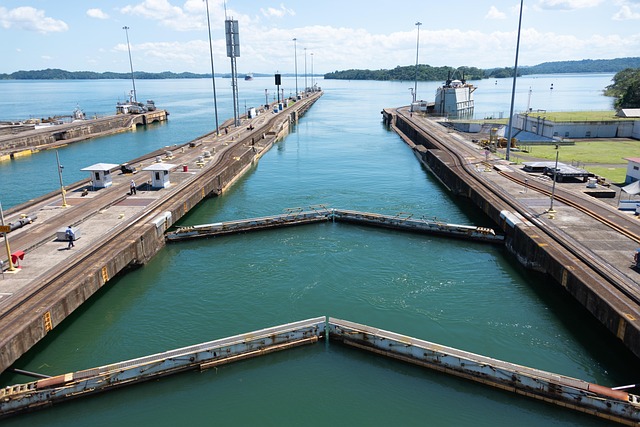
Understanding the Panama Canal Controversy: What You Need to Know
In a world where countries have to work together to keep trade moving smoothly, the Panama Canal stands out as a crucial point of transit for ships traveling between the Atlantic and Pacific Oceans. However, recent discussions between the United States and Panama about fees for U.S. government vessels have stirred up a lot of controversy. Let’s unpack this situation, so we can all understand it better, especially as it ties into larger matters like sovereignty, international relations, and trade.
The Panama Canal: A Brief Overview
First, let’s talk about the Panama Canal itself. Picture this: a narrow strip of land connecting two massive oceans. That is the Panama Canal! It was completed in 1914 and has since been a vital shortcut for ships. Without the canal, vessels would have to sail around the southern tip of South America, which adds thousands of miles to their journey. This canal is not just important for the countries that border it; it plays a significant role in global trade, making it easier and faster for goods to be transported from one part of the world to another.
Over the decades, the canal changed hands. After nearly 100 years of U.S. control, it was handed back to Panama in 2000. This was a monumental moment in Panamanian history, as it signified their independence and ability to govern their own territory—a point of pride for many Panamanians. Since then, Panama has managed the canal’s operations and has been responsible for setting the rules and fees regarding its use.
The Recent Controversy
Now, let’s dive into the recent uproar. U.S. Secretary of State Marco Rubio made a statement implying that the Panamanian government had agreed to eliminate fees for U.S. government vessels as they transit the canal. This proclamation did not sit well with the Panamanian government—especially with President Raúl Mulino. In response, Mulino called Rubio’s comments an “intolerable” falsehood, expressing that trust and truthfulness are essential when it comes to relationships between countries.
This back-and-forth has raised eyebrows because it touches on important issues like how countries interact with one another and who has power over certain territories. While Rubio expressed a hope or expectation regarding fee removal, he also acknowledged Panama’s right to manage its own laws. This sentiment is crucial since it shows respect for Panama’s sovereignty—a term that considers a country’s authority over its own affairs and land.
Why This Matters
So, why does this dispute matter? Beyond the immediate backlash, it underscores the delicate balance of international relations. It can be easy to see countries as friendly allies or adversaries based on the headlines we read. However, there’s often a much deeper history and context behind these disagreements. For Panama, the control of the canal is about more than just fees; it’s about national pride and recognition of their authority.
It’s also important to understand the backdrop of this controversy. There have been growing concerns about China’s expanding influence in Central America and the Caribbean. China’s involvement in trade, investments, and infrastructure projects is seen as a challenge to the U.S.’s traditional dominance in the region. The U.S. government is likely paying close attention to these dynamics, influencing their approach to countries like Panama.
Moreover, the canal remains an essential route for U.S. naval and commercial vessels. So, it’s not just about a fee here and there; it’s about national security and economic interests. Given that context, it’s understandable why there might be heated discussions around this topic.
A Personal Touch: What This Means to Me
As a student interested in international relations and geography, I find the Panama Canal situation particularly fascinating. It’s like a live chess game happening on the global stage. Each move countries make can impact economics, security, and even the daily lives of people in various parts of the world.
Imagine being part of the Panamanian government, feeling proud of your nation’s reclaiming of the canal, and then hearing a powerful figure from another country make a claim about your territory. It’s a bit like someone moving into your house and then trying to dictate how you manage it! The situation highlights the importance of clear communication, mutual respect, and careful negotiations among nations. It’s a reminder that behind every political statement, there are real people who can be affected by the decisions made.
What Comes Next?
So, what happens from here? This incident has made it clear that navigating international relations is often tricky. The U.S. and Panama will need to negotiate effectively to maintain their relationship. For the U.S., understanding and acknowledging Panama’s control over the canal while finding a balance that works for both nations will be key.
As students and future leaders, it’s essential to pay attention to these kinds of events. They shape not only the political landscape but also influence economic trends that affect our lives. For instance, trade agreements often impact the prices that consumers—like you and me—pay for products at the store. The ripple effects of diplomatic decisions can reach far and wide.
Conclusion: What Do You Think?
In conclusion, the controversy surrounding the Panama Canal illustrates the complexity of international relations. It’s not just about fees or borders; it’s about ownership, respect, and the dynamics between powerful nations. Each situation like this one is a learning opportunity for all of us.
What do you think about the U.S. government’s approach towards Panama? Do you believe it’s fair for the U.S. to expect fee removals for their vessels, or do you think Panama has every right to charge fees as they see fit? I’d love to hear your thoughts! Please share your opinions in the comments below.





